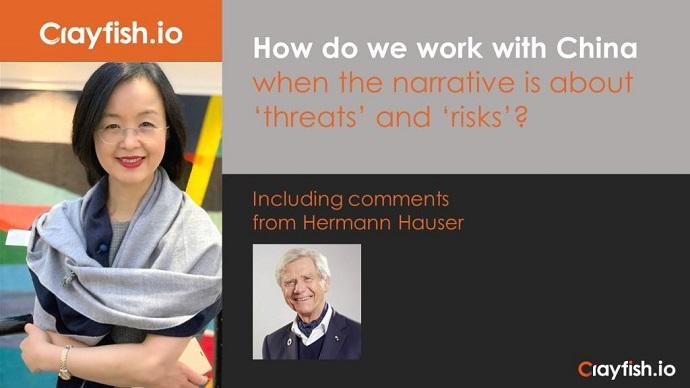Ting Zhang, Founder & CEO of Crayfish.io tells Business Leader magazine, the go-to resource for entrepreneurs and business leaders, why the UK should be ‘doing business’ with China.
There was a time, pre-pandemic, when it seemed China could do no wrong.
Ahead of the 2015 state visit to the UK by President Xi Jinping, the UK’s then prime minister, David Cameron spoke glowingly of a ‘golden era’ of bilateral relations between the UK and China. And, indeed, we witnessed many of the smaller tech companies expanding successfully into China and scaling up quickly. In fact, the UK became one of China’s largest trade partners.
And now the pendulum has swung. We are warned about the threats to global security on the one hand, and, on the other, the risks to IP, both of which propagate this idea that, really, the UK shouldn’t be having anything to do with China at all.
Whichever view you take, one thing you can be certain of is that China boasts the largest single market in the world bar none, and that’s going to keep on growing. China is engaged in a concerted and strategic economic contest – but a growing China that plays by international rules would indeed be of global interest.
China now has its own national semiconductor initiative and is spending $250billion on this industry alone, with an eye on developing and producing its own expert home-grown talent and self-sufficient industries.
The US is spending just a fraction of that, $50billion, on its 2022 CHIPS Act to bring some of its technology production back to US soil, in line with Europe launching a $50billion initiative to double its market share to 20%.
And here in the UK, the government has recently announced a rather paltry (by comparison) $1bn investment in its domestic semiconductor industry boosted somewhat by a Semiconductors Partnership with Japan whereby Japan will invest £17.7billion in UK business and projects in the UK. This partnership comes with a promise to cooperate and exchange on R&D and skills, bolstering supply chain resilience in this increasingly competitive market.
Nevertheless, China is still spending more and producing and deploying more engineers than the US, Europe and UK put together, even with Japan’s financial injection. So, it is foolhardy to be ignoring China when you can’t even compete. Most significantly, to be able to pull off a global technology success, you need to be doing business with China. There’s just no way round it.
I recently had the privilege of speaking to legendary entrepreneur, Hermann Hauser about this very subject. It was just before former UK prime minister Liz Truss urged the West not to work with China during a speaking engagement in Taiwan.
As a tech pioneer and founder/co-founder of a wide range of technology companies including Acorn Computers (where he helped spin out Arm), Hermann has been championing the UK tech sector for decades. He was even a member of the select delegation accompanying Lord Sainsbury to the first UK|China Tech Forum in Beijing back in 2001.
Hermann insisted that instead of cold-shouldering China, the only viable strategy for the UK (and indeed, the rest of the Western world) is to be negotiating with China while there is still something to negotiate with. Currently, there is still an opportunity for the West to do a deal with China on these advanced technologies and get something in return. More recently, having invested in several deeptech companies, he understands the importance of doing business with China if you want to be a global success.
In our conversation, Hermann felt a good outcome for the West vs China situation would be something akin to what happened with the Japanese car industry, and where the agreed solution was for the Japanese car companies to build factories in Europe and the US. This ensured they would employ a local workforce, trade deficits would be diminished, and economies would become more integrated. And it succeeded in establishing a happy relationship between the Western world and Japan. As Hermann says, should we be trying for the same with China which would create an international supply chain with lower production costs and an increased choice of suppliers, to the benefit of everyone?
Hermann told me:
“The future of the semiconductor industry relies on the hyperconnectivity that now exists in a globalized world; the interdependence we have on each other. There is always a risk that China could take the compound semiconductor technology and use it for military purposes, which is why it is implicit there are export restrictions for what’s produced in the West. But the alternative is far, far worse: a situation where China is producing its own advanced technology, so the rest of the world is dependent on them – and that’s not a very good alternative.”
There have, however, been some early signs that the US may be relaxing its stance re China.
In President Joe Biden’s last speech, he has made a deliberate move away from using the word ‘de-coupling’, using ‘de-risking’ instead – reinforcing the need for a supply chain with a multiple choice of suppliers at each level so that we do not become dependent on a single country that then can use their monopoly as a choke point. And what Biden and Washington are starting to realise is that there is just no getting rid of the globalized supply chain.
French president, Emmanuel Macron also visited China recently, which has resulted in many business wins for French businesses.
However, speaking at the G7 conference, UK prime minister Rishi Sunak described China as “the only country with both the means and intent to reshape the world order”, and outlined the threat the superpower poses to the world. He said: “We will work together as the G7 and other countries make sure that we can de-risk ourselves and the vulnerability of supply chains that we have seen from China, take the steps necessary to protect ourselves against hostile investment, and do so in a way that doesn’t damage each other.”
One of the main barriers for tech companies to do business in China is Intellectual Property (IP) risk. Hermann believes that given the size of the Chinese market, all deep tech companies should have a relationship with China, and while it is important to be aware and alert to the concerns around IP theft, it shouldn’t put you off.
In fact, there is now more legal support in China to protect IP than ever, largely because so much IP is now being generated in China itself. And China is continuing to develop its court system further to ensure foreign companies feel comfortable that their IP is protected and can be vigorously defended in the Chinese courts.
What we both agree on, is that the situation with China will continue to play out for at least another decade, and that’s the real caution. Because the West then needs to have a realistic understanding of where China may have progressed to without them in that time.



